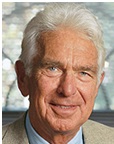|
 |
|
 |
|
|
||
Warren Bennis (1925- 2014)
American professor, leadership expert (pictured right) and adviser to four American presidents including;
Key books
Leaders (1985), written with Burt Nanus (pictured right below) (see for more detail Leaders in the Business Books section)
Successful leaders have four common characteristics:
1. Attention through vision Defining a vision (a future ideal for the organization) and achieving this vision through:
2. Managing through communication Effectively communicating the vision, so that employees are enthusiastically committed to it.
3. Trust through positioning Empowering people to take responsibility for excellent performance. Such empowerment requires
4. Management of self Leaders must exploit their strengths and minimize their weaknesses through:
The five myths of leadership are:
1. Leadership is a rare skill.
2. Leaders are born, not made.
3. Leaders are necessarily charismatic.
4. Leadership exists only at the top of the organization (groups and business units also need it).
5. The leader controls and manipulates (empowerment is much more important).
Key quotes on leadership Managers are the people who do things right and leaders are people who do the right thing.
Leadership creates a commonwealth of learning, and that, in turn is what effective organizations are.
The essential thing in organizational leadership is that the leader’s style pulls rather than pushes people on.
On Becoming A Leader (1989) The best leaders have:
a) guiding vision (with mission and inspirational purpose).
b) integrity (morality and recognizing and correcting personal weaknesses) -the basis of trust.
c) passion (for their work and decisions)
d) persistence (through difficulty and failure)
e) communication skills (inspiring people and giving hope)
f) curiosity and daring (with a hunger for learning)
Key quote The leader who communicates passion gives hope and inspiration to other people.
Why Leaders Can’t Lead (1989)
Leaders must release the brain power of their employees by overcoming:
Key quote People in authority must be social architects.
Beyond Bureaucracy (1965) Hierarchical and autocratic control (what Max Weber ,pictured right above, called bureaucracy) will be replaced by creative teams of specialists given a particular job to do (an “organic-adaptive” structure). This is similar to Burns and Stalker’s organic structure.
|
|
|
||
|
|
||
| Copyright © wisdomtowin.com 2025 All Rights Reserved | ||
|





